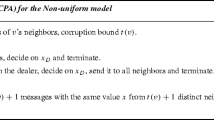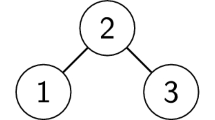Abstract
A new protocol is presented that allows to convince of the knowledge of a solution to the Independent Vertex Set Problem without revealing anything about it. It is constructed from a bit commitment scheme based on the hardness of the Discrete Logarithm Problem, which guarantees its efficient performance and formal security. One of its possible applications is node identification in ad-hoc wireless network because it does not require any authentication servers. Furthermore, recent works on network security has pointed out the importance of the design of efficient Zero Knowledge Proofs of Knowledge for the Independent Vertex Set Problem in broadcast models.
Research partly supported by the Spanish Ministry of Education and Science and the European FEDER Fund under Project SEG2004-04352-C04-03.
Preview
Unable to display preview. Download preview PDF.
Similar content being viewed by others
References
Brassard, G., Chaum, D., Crépeau, C.: Minimum disclosure proofs of knowledge. Journal of Computer and System Sciences 37, 156–189 (1988)
Brockington, M., Culberson, J.: Camouflaging independent vertex sets in quasi-random graphs. In: Johnson, D., Trick, M. (eds.) Cliques, Coloring and Satisfability, vol. XXVI, pp. 75–88. American Mathematical Society, Providence (1994)
Caballero, P., Hernández, C.: Strong Solutions to the Identification Problem. In: Wang, J. (ed.) COCOON 2001. LNCS, vol. 2108, pp. 257–261. Springer, Heidelberg (2001)
Chaum, D., Evertse, J.H., van de Graaf, J., Peralta, R.: Demonstrating possession of a discrete logarithm without revealing it. In: Odlyzko, A.M. (ed.) CRYPTO 1986. LNCS, vol. 263, pp. 200–212. Springer, Heidelberg (1987)
Desmedt, Y., Wang, Y.: Efficient Zero-Knowledge Protocols for Some Practical Graph Problems. In: Cimato, S., Galdi, C., Persiano, G. (eds.) SCN 2002. LNCS, vol. 2576, pp. 290–302. Springer, Heidelberg (2003)
Feige, U., Fiat, A., Shamir, A.: Zero-knowledge proofs of identity. Journal of Cryptology 1, 77–95 (1988)
Fiat, A., Shamir, A.: How to prove yourself: practical solutions to identification and signature problems. In: Odlyzko, A.M. (ed.) CRYPTO 1986. LNCS, vol. 263, pp. 186–194. Springer, Heidelberg (1987)
Fortin, S.: The Graph Isomorphism Problem. Technical Report TR 96-20, University of Alberta, Department of Computer Science (1996)
Fortnow, L.: The complexity of perfect zero-knowledge. In: Proceedings of the Nineteenth Annual ACM Symposium on Theory of Computing, STOC 1987, pp. 204–209 (1987)
Franklin, M., Wrigh, R.: Secure communication in minimal connectivity models. Journal of Cryptology 13, 9–30 (2000)
Goldreich, O., Micali, S., Wigderson, A.: How to prove all NP-statements in zero-knowledge, and a methodology of cryptographic protocol design. In: Odlyzko, A.M. (ed.) CRYPTO 1986. LNCS, vol. 263, pp. 171–185. Springer, Heidelberg (1987)
Goldwasser, S., Micali, S., Rackoff, C.: The knowledge complexity of interactive proof-systems. In: Proceedings of the Seventeenth Annual ACM Symposium on Theory of Computing (STOC 1985), pp. 291–304 (1985)
Santis, A.D., Crescenzo, G.D., Goldreich, O., Persiano, G.: The graph clustering problem has a perfect zero-knowledge proof. Information Processing Letters 69, 201–206 (1999)
Schnorr, C.P.: Efficient identification and signatures for smart cards. In: Brassard, G. (ed.) CRYPTO 1989. LNCS, vol. 435, pp. 239–252. Springer, Heidelberg (1990)
Author information
Authors and Affiliations
Editor information
Editors and Affiliations
Rights and permissions
Copyright information
© 2005 Springer-Verlag Berlin Heidelberg
About this paper
Cite this paper
Caballero-Gil, P., Hernández-Goya, C. (2005). Algorithm for Proving the Knowledge of an Independent Vertex Set. In: Moreno Díaz, R., Pichler, F., Quesada Arencibia, A. (eds) Computer Aided Systems Theory – EUROCAST 2005. EUROCAST 2005. Lecture Notes in Computer Science, vol 3643. Springer, Berlin, Heidelberg. https://doi.org/10.1007/11556985_45
Download citation
DOI: https://doi.org/10.1007/11556985_45
Publisher Name: Springer, Berlin, Heidelberg
Print ISBN: 978-3-540-29002-5
Online ISBN: 978-3-540-31829-3
eBook Packages: Computer ScienceComputer Science (R0)




